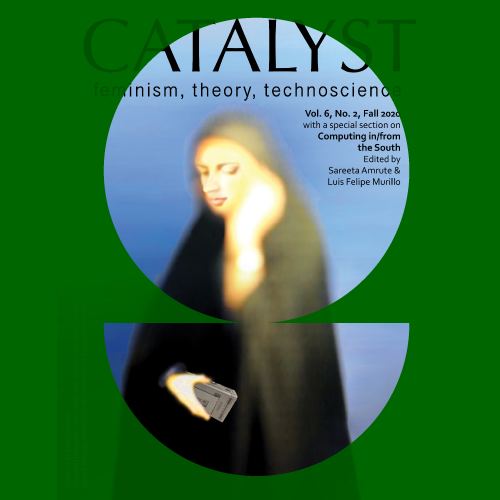Sareeta Amrute (she/her) is Director of Research at Data & Society and Associate Professor of Anthropology at the University of Washington. She studies the production of race and class in U.S. & E.U. programming economies, and that of financial good through data-centric technologies in India.
Héctor Beltrán (he/him) is Assistant Professor of Anthropology at MIT. His book manuscript, “Code Work: Hacking Across the US/Mexico Techno-Borderlands,” examines the political economy of knowledge work and manifestations of “hacking” between the US and Mexico. Twitter: @teflonbeltran
Fabiane M. Borges is a Psychologist, Arts and Science researcher, and Founder of the SACI-E program for research and art residence at INPE/Brazil.
Antônio Carlos (TC) (he/him) has over 50 years of activism in the organized Black movement. He is a musician, composer, and engineering self-didact. He is also the founder of the cultural center “Casa Tainã” and main proponent of “Mocambos network” from which “Baobaxia” was created. He won several awards for his community work and has been dedicated to the creation of technological alternatives for Quilombola and other traditional communities, such as Free Software based data centers and community spaces for technological appropriation.
Silvio Carlos (he/him) is a senior developer specialized in information
security, working at Instituto Socioambiental (ISA) in Brazil. Silvio is responsible for open data platforms such as “Indigenous People’s Encyclopedia” and “Terras+” Indigenous Lands Indicators System. He worked as a researcher on data management at the “Cinemateca Brasileira” and has extensive experience in security and free software development.
Francisco Caminati (UNESP) (he/him) is the coordinator of the project “Siwazi Rowaihuuze Auwe, Xavante network: connectivity, data management, and internet appropriation by indigenous people.” He has been working for more than 15 years in large-scale public policies programs and in situated independent initiatives for community networking in Brazil.
Hemangini Gupta (she/her/hers) is working on a manuscript of how forms of startup capitalism reshaped the city of Bangalore, India. http://hemanginigupta.com/
Linet Juma (she/her) is an international development and public policy researcher whose work focuses on the use of data and evidence-informed approaches for inclusive and sustainable development.
Erin McElroy (they/them) is a postdoctoral researcher at NYU’s AI Now Institute working at the intersections of property, race, technology, and gentrification, and is cofounder of the Anti-Eviction Mapping Project and the Radical Housing Journal.
Aurelia Munene (she/her) is a Kenyan qualitative researcher with a heart for growing and supporting African scholars to produce and use knowledge imaginatively.
Luis Felipe R. Murillo (he/him) is Associate Researcher, School of Data Science at University of Virginia’s Center for Data Ethics & Justice.
Nadège (she/her) is an eclectic eccentric introvert prone to ramifications, fusions and vibrations. She has been involved in transfeminist tech projects like “Laboratorio de Interconectividades” collective and Kéfir infrastructure co-op. Currently, N. plays music, cooks, and sometimes works as a freelance translator, illustrator and documentator.
Angela Okune (she/her) studies data practices and infrastructures of research groups working in and on Nairobi, Kenya in order to explore broader questions of equity, knowledge production and socio-economic development in Africa.
Veda Popovici (she/her) is a political worker based in Bucharest with an interest in decolonial thought, intersectional feminism, anti-fascism and material possibilities of creating the commons, and whose work has developed through radical collectives such as Macaz, the Alternative Library, Dysnomia, the Gazette of Political Art, and the Common Front for Housing Rights.
Natacha Roussel (she/her) is active in the development and collective practice of free software.
Saiph Savage (she/her), Co-Director of the Civic Innovation Lab at the National Autonomous University of Mexico (UNAM), designs civic technology to empower invisible workers. Twitter: @saiphcita
Ariane Stolfi (she/her), architect and phd in Sonology, is lecturer of the Federal University of Southern Bahia, researching sound, image and Interaction.
Angela Xiao Wu (she/her/hers) researches cultural production and knowledge making with a focus on data, analytics, media, and information technology.
About Rede Mocambos Network
Rede Mocambos is a solidarity network of quilombola communities, indigenous, urban, rural, civil society associations, and points of culture, from north to south of Brazil, connected through information and communication technologies. The Network builds partnerships from different segments so that in a collaborative and collective way we can bring together different programs, projects and actions aimed at human, social, economic, cultural, environmental and preservation of the historical-memory heritage of these communities. The main axes that the Network sees are cultural identity, local development, technological appropriation, social inclusion and cultural identity. The idea of the Network was born in quilombos, in particular an urban quilombo, the Casa de Cultura Tainã.
About Catalyst Journal
Catalyst Journal invites and seeks to support creative, critical research in multiple platforms: text, image-text essays, video works, sound projects, and so on. This presents opportunities for collectively exploring modes of access. Without making assumptions about the individual needs of our readers, editors, and authors, we recognize the demands entailed by a commitment to disability politics. Demands are political and do not lend themselves to easy and definite closures.
About Data & Society
Data & Society is an independent nonprofit research institute studying the social implications of data-centric technologies & automation. Our public events present timely conversations about the purpose and power of technology, bridging our interdisciplinary research with broader public discussions.


